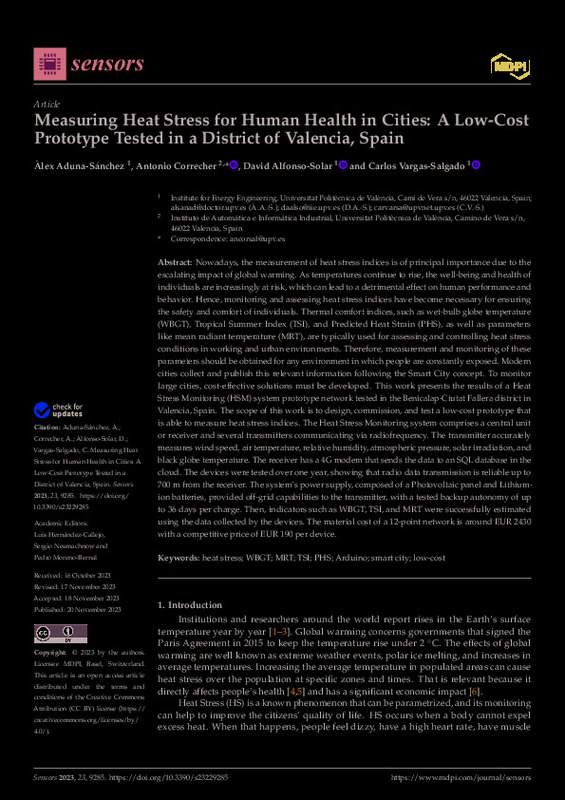JavaScript is disabled for your browser. Some features of this site may not work without it.
Buscar en RiuNet
Listar
Mi cuenta
Estadísticas
Ayuda RiuNet
Admin. UPV
Measuring Heat Stress for Human Health in Cities: A Low-Cost Prototype Tested in a District of Valencia, Spain
Mostrar el registro sencillo del ítem
Ficheros en el ítem
| dc.contributor.author | Aduna-Sánchez, Àlex
|
es_ES |
| dc.contributor.author | Correcher Salvador, Antonio
|
es_ES |
| dc.contributor.author | Alfonso-Solar, David
|
es_ES |
| dc.contributor.author | Vargas-Salgado, Carlos
|
es_ES |
| dc.date.accessioned | 2024-01-16T19:02:08Z | |
| dc.date.available | 2024-01-16T19:02:08Z | |
| dc.date.issued | 2023-11 | es_ES |
| dc.identifier.uri | http://hdl.handle.net/10251/201952 | |
| dc.description.abstract | [EN] Nowadays, the measurement of heat stress indices is of principal importance due to the escalating impact of global warming. As temperatures continue to rise, the well-being and health of individuals are increasingly at risk, which can lead to a detrimental effect on human performance and behavior. Hence, monitoring and assessing heat stress indices have become necessary for ensuring the safety and comfort of individuals. Thermal comfort indices, such as wet-bulb globe temperature (WBGT), Tropical Summer Index (TSI), and Predicted Heat Strain (PHS), as well as parameters like mean radiant temperature (MRT), are typically used for assessing and controlling heat stress conditions in working and urban environments. Therefore, measurement and monitoring of these parameters should be obtained for any environment in which people are constantly exposed. Modern cities collect and publish this relevant information following the Smart City concept. To monitor large cities, cost-effective solutions must be developed. This work presents the results of a Heat Stress Monitoring (HSM) system prototype network tested in the Benicalap-Ciutat Fallera district in Valencia, Spain. The scope of this work is to design, commission, and test a low-cost prototype that is able to measure heat stress indices. The Heat Stress Monitoring system comprises a central unit or receiver and several transmitters communicating via radiofrequency. The transmitter accurately measures wind speed, air temperature, relative humidity, atmospheric pressure, solar irradiation, and black globe temperature. The receiver has a 4G modem that sends the data to an SQL database in the cloud. The devices were tested over one year, showing that radio data transmission is reliable up to 700 m from the receiver. The system's power supply, composed of a Photovoltaic panel and Lithium-ion batteries, provided off-grid capabilities to the transmitter, with a tested backup autonomy of up to 36 days per charge. Then, indicators such as WBGT, TSI, and MRT were successfully estimated using the data collected by the devices. The material cost of a 12-point network is around EUR 2430 with a competitive price of EUR 190 per device | es_ES |
| dc.description.sponsorship | This research was funded by the European Union¿s Horizon 2020 research and innovation program under the project Green Cities for Climate and Water Resilience, Sustainable Economic Growth, Healthy Citizens and Environments (GROWGREEN) with reference 730283. | es_ES |
| dc.language | Inglés | es_ES |
| dc.publisher | MDPI AG | es_ES |
| dc.relation.ispartof | Sensors | es_ES |
| dc.rights | Reconocimiento (by) | es_ES |
| dc.subject | Heat stress | es_ES |
| dc.subject | WBGT | es_ES |
| dc.subject | MRT | es_ES |
| dc.subject | TSI | es_ES |
| dc.subject | PHS | es_ES |
| dc.subject | Arduino | es_ES |
| dc.subject | Smart city | es_ES |
| dc.subject | Low-cost | es_ES |
| dc.subject.classification | MAQUINAS Y MOTORES TERMICOS | es_ES |
| dc.subject.classification | INGENIERIA DE SISTEMAS Y AUTOMATICA | es_ES |
| dc.subject.classification | INGENIERIA ELECTRICA | es_ES |
| dc.title | Measuring Heat Stress for Human Health in Cities: A Low-Cost Prototype Tested in a District of Valencia, Spain | es_ES |
| dc.type | Artículo | es_ES |
| dc.identifier.doi | 10.3390/s23229285 | es_ES |
| dc.relation.projectID | info:eu-repo/grantAgreement/EC/H2020/730283/EU | es_ES |
| dc.rights.accessRights | Abierto | es_ES |
| dc.contributor.affiliation | Universitat Politècnica de València. Escuela Técnica Superior de Ingeniería del Diseño - Escola Tècnica Superior d'Enginyeria del Disseny | es_ES |
| dc.contributor.affiliation | Universitat Politècnica de València. Escuela Técnica Superior de Ingenieros Industriales - Escola Tècnica Superior d'Enginyers Industrials | es_ES |
| dc.description.bibliographicCitation | Aduna-Sánchez, À.; Correcher Salvador, A.; Alfonso-Solar, D.; Vargas-Salgado, C. (2023). Measuring Heat Stress for Human Health in Cities: A Low-Cost Prototype Tested in a District of Valencia, Spain. Sensors. 23(22):1-23. https://doi.org/10.3390/s23229285 | es_ES |
| dc.description.accrualMethod | S | es_ES |
| dc.relation.publisherversion | https://doi.org/10.3390/s23229285 | es_ES |
| dc.description.upvformatpinicio | 1 | es_ES |
| dc.description.upvformatpfin | 23 | es_ES |
| dc.type.version | info:eu-repo/semantics/publishedVersion | es_ES |
| dc.description.volume | 23 | es_ES |
| dc.description.issue | 22 | es_ES |
| dc.identifier.eissn | 1424-8220 | es_ES |
| dc.identifier.pmid | 38005671 | es_ES |
| dc.identifier.pmcid | PMC10674217 | es_ES |
| dc.relation.pasarela | S\503994 | es_ES |
| dc.contributor.funder | COMISION DE LAS COMUNIDADES EUROPEA | es_ES |
| dc.subject.ods | 11.- Conseguir que las ciudades y los asentamientos humanos sean inclusivos, seguros, resilientes y sostenibles | es_ES |








